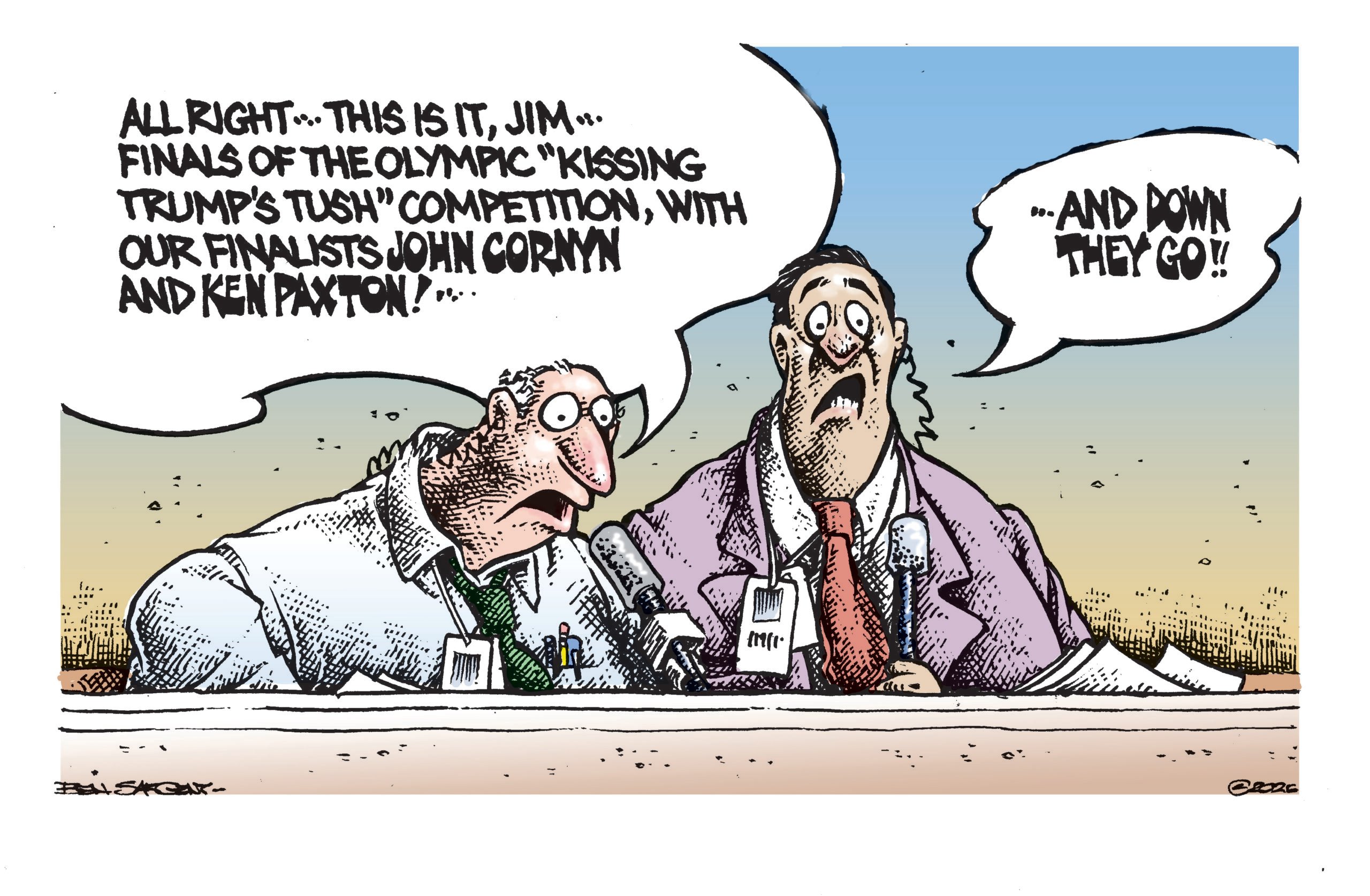Innocence Lost
In his new memoir, attorney David Dow offers a glimpse inside Texas’ death penalty machine.

If you’re a death row inmate in Texas, you likely will spend the final hours of your life in a small holding cell about 10 feet from the execution chamber in Huntsville, waiting to hear if your final appeals will spare you. Your lawyer will call and, with few exceptions, say the courts and the governor have denied your clemency requests, and that you have minutes left to live.
David Dow has made many of these calls. A law professor at the University of Houston and a death penalty lawyer with the nonprofit Texas Defender Service, Dow has for two decades represented inmates facing execution. He often is one of the last people they talk to.
As Dow writes in his new memoir, The Autobiography of an Execution, these last calls are among the worst moments. What do you say to someone who’s about to die? Dow tries to avoid uttering the kinds of pat phrases common to normal conversation—see you soon; talk to you later; take care of yourself—that have no meaning to a condemned man.
Insights like these make Dow’s memoir a revelation, even for people who follow criminal justice issues. Nearly every case Dow handles, even those of men obviously guilty, contains a gross violation of the defendant’s constitutional rights. Some had lawyers who slept through trial, others are mentally disabled, and some have key DNA evidence that was never tested.
The heart of the book is the case of Henry Quaker. (That’s not his real name. In an unusual move, Dow changed the names and identifying details of the clients in the book to protect attorney-client privilege.) Dow comes to believe that Quaker—convicted of killing his wife and kids—is innocent. Dow’s overworked attorneys turn up compelling evidence that Quaker was wrongly convicted. In the book’s final chapters, they race to stop his execution.
Dow is an avowed opponent of capital punishment. But his memoir isn’t a polemic. His mission is to show how the execution process works, to offer a glimpse inside a flawed system that continues to shuffle people into the death chamber.
The Observer recently spoke with Dow about his work, his memoir and the criminal justice system.
Texas Observer: There are several instances in the book where you take on someone’s case at the last minute, and it turns out their attorney had slept through the trial or their initial appellate attorney had done a terrible job and ignored obvious avenues of appeal. These things seem to come up again and again.
Dow: They do. There was a famous case from Harris County involving a death row inmate by the name of Calvin Burdine, who was convicted and sentenced to death. He was ultimately moved off death row because his lawyer had been sleeping. A federal district judge ruled that he was therefore entitled to a new trial, and the 5th Circuit Court of Appeals upheld that. Well, that’s great. But what goes unnoticed is that the same lawyer who represented Calvin Burdine and who fell asleep in Calvin Burdine’s trial had represented probably a dozen other people, and he’d fallen asleep in their trials, too. None of them got relief. In fact, almost all of them have been executed. So one of the things I try to do in the book is just reveal how common it is for these types of violations to occur, but also, despite how common it is for these types of violations to occur, how uncommon it is for death row inmates to get any legal relief.
Does it just come down to dumb luck at a certain point—who gets executed and who doesn’t? If you’re wealthy, you can control your fate. But if you’re not in that category, if you’re not in the category of someone who has an endlessly deep bank account, then it depends a whole lot on luck. It depends who the trial lawyers are. It depends on what kinds of resources the trial judge makes available to those lawyers. It depends on what kind of people you have on your jury. It depends on what kind of appellate lawyers you have. It’s just one coin flip after another.
Let me move on to the Henry Quaker case, which is so much of a line running through the heart of the book. Do you believe he’s innocent? I do. I say in the afterword that I’ve had seven cases or so where I’m convinced that my client was innocent. And not all those people have been executed. No, I don’t think he did it … .
[But] I don’t think that identifying cases of an innocent person is going to cause the machinery of death in Texas to ground to a halt. If that were going to happen, it would have already happened. There have been enough questionable cases that if people were really going to stop supporting capital punishment because they thought someone innocent was executed, that would have already happened.
I was looking at a public opinion poll the other day asking people if they knew someone innocent had been executed, would that stop them from supporting the death penalty. The answer from a majority of people was no. That has to be the only right answer. The truth is you have to be an idiot to think that nobody innocent has been executed. We know about all the mistakes that the criminal justice system makes. We’ve had 250 people who’ve been exonerated on the basis of DNA. So you would have to somehow believe that we’ve had people exonerated for committing every crime except for murder. Or that we’ve had people exonerated who’ve been in every wing of the prison except death row. It just doesn’t make any sense. It’s obvious that we’re going to have innocent people on death row, and it’s obvious that we’re going to occasionally execute them because there isn’t time to discover their innocence or because there isn’t DNA that’s going to prove it to the satisfaction of everybody. So once you say that it’s obvious we’re going to execute innocent people, which it is, then how can you possibly support the death penalty unless you’re willing to pay that price?
Another aspect of this is the pain that the family of the person being executed experiences. I don’t think that’s something most people think about. One of the most tragic duties of a death penalty lawyer in Texas is telling the family members of your client that it’s over and he’s going to be executed … and just watching them collapse.
In a lot of these cases, the people who I represent have just been horribly abused by their family, by their parents mostly, but sometimes by their aunts or siblings. So in some of these cases, on top of a mother or father learning that their son is about to be executed, it’s complicated by the fact that we as death penalty lawyers have spent the years working on the case uncovering all the dysfunction and brutality that happened in that family. So you wind up with a very volatile relationship at the end. … There’s this connection particularly between moms and children that seems almost immune from severing. I mean, the worst type of brutality and there’s still this bond … that causes moms to weep hysterically when they’re witnessing this execution even though in a sense the moms are in part responsible for the environment that—at least in my judgment—led to the tragedy.
I don’t think you need to suggest that the murderer and the murder victim are morally equivalent to understand that the family members of those two are suffering something that might not be identical, but it’s pretty close.
At a certain point, it has to become nonsensical. If you feel like you’ve got a compelling case and you should win, but you don’t. Exactly. There are too many variables that have to break just right for you to win in these cases. Obviously, you have to have a winning legal issue. But in addition to that, in most of these cases, you have to have a sympathetic story. You have to have told the story in a way that makes the legal issue compelling. It’s not just a law exam. You’re writing for judges who are human beings. So you need the compelling legal claim, but you also need the story. On top of the story, you need to have some procedural luck in order to make it, number one, interesting to the Supreme Court, but number two, a case that they can even do anything with. … It doesn’t happen very often.
The modern death penalty debate—not the moral debate, but the legal debate—is generally a debate between people who advocate finality on one hand versus people who advocate adherence to other legal principles. That’s the debate. Are we going to explore these constitutional violations for five years, 10 years, 15 years, or are we finally going to say the case is over? You had a trial. Jury found you guilty. Jury sentenced you to death. That’s it, we gotta move on. … Implicit in that—in the arguments for finality—is of course we’re going to make a mistake. One of the consequences is you’re going to execute innocent people. But if you’re a proponent of finality, you’ve made the decision that’s a price you’re willing to pay.


